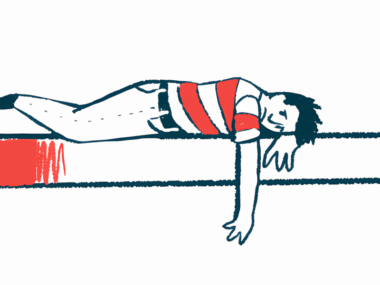Advocating for mental healthcare is important to me as a ‘HemoWife’
How my role as a caregiver helps me understand the value of mental well-being
Written by |

As a “HemoWife,” I’ve become intimately acquainted with the intricate dance between physical and mental health. In recent columns, I’ve delved into the journey of navigating my husband Jared’s hemophilia alongside my own anxieties and explained how the two are connected.
But mental and physical health are related in countless other ways, too. For example, people who experience anxiety or depressive disorders are at a higher risk of developing chronic conditions such as heart disease or diabetes.
It’s an established fact that mental health is important for our overall well-being. Just like physical health, it plays a vital role in our lives, influencing our thinking, feelings, and behavior. As such, mental health distress can hamper our ability to function optimally. We may struggle at work or at school, and our relationships may also suffer.
When mental health is overlooked
Unfortunately, mental health often takes a back seat because it lacks the visibility of physical issues. Yet, just as Jared, who has severe hemophilia B, requires prompt medical attention for bleeds and injuries, it’s equally vital to address mental health concerns promptly. Just as his body needs factor infusions to maintain stability, our minds may sometimes require a “reset” in the form of conversational or chemical interventions.
The weight of chronic illness goes beyond physical symptoms, deeply impacting mental health. Occasionally, Jared expresses how the prolonged incapacitation during recovery from an injury can lead him to feel useless and weak. This, in turn, leads to feelings of guilt for inconveniencing those who care for him. Though none of these beliefs are true, his mind does quite a convincing job at persuading him otherwise.
As a caregiver, I’ve faced my own mental health struggles, prompting me to seek support when needed. I’ve realized that providing good care requires me to show up as my best self for those who rely on me. Sometimes that means recognizing when I need help, seeking support from others, and actively working on my own issues.
Destigmatizing mental health requires a perspective shift
Mental health stigma is still a big problem in today’s society. As a result, many people feel forced to hide their struggles and suffer alone. Yet I strongly believe that by working on making mental health issues less taboo, and encouraging those struggling to get professional help when needed, we can create a supportive environment where asking for help is normal. Recognizing that mental health is a medical issue is an important part of this.
Seeking the help of a mental healthcare professional has vastly helped Jared in tackling his own issues. He emphasizes that consistent therapy, especially during mental distress, has been crucial in keeping him grounded to navigate physical and personal challenges. He has always encouraged me to seek medical help, especially during highs or lows triggered by my attention-deficit/hyperactivity disorder, crippling anxiety, and bipolar II disorder. While not everyone may have the luxury of finding and accessing a psychiatrist or therapist who matches them perfectly, Jared and I believe that seeking outside help is preferable to suffering in silence.
Recognizing the need for professional assistance doesn’t diminish the value of personal self-care practices. Instead, it complements them; some mental health conditions may just require additional specialized treatment and support. By staying attuned to our mental well-being and advocating for professional intervention when necessary, we can nurture resilience and build a foundation for a balanced and fulfilling life.
My role as a HemoWife and caregiver puts me in a position to champion holistic wellness and the dismantling of barriers to mental healthcare. After all, true wellness involves harmony between body and mind. Through this equilibrium, we can thrive on our journey forward.
Note: Hemophilia News Today is strictly a news and information website about the disease. It does not provide medical advice, diagnosis, or treatment. This content is not intended to be a substitute for professional medical advice, diagnosis, or treatment. Always seek the advice of your physician or another qualified health provider with any questions you may have regarding a medical condition. Never disregard professional medical advice or delay in seeking it because of something you have read on this website. The opinions expressed in this column are not those of Hemophilia News Today or its parent company, Bionews, and are intended to spark discussion about issues pertaining to hemophilia.




Leave a comment
Fill in the required fields to post. Your email address will not be published.